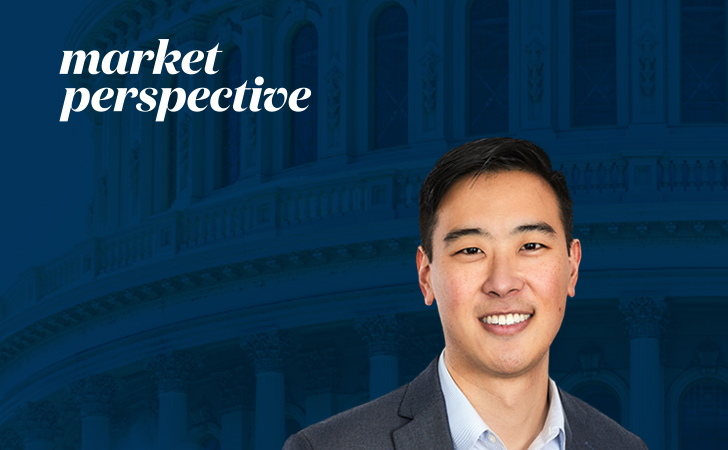
Summary
With Republicans securing control of Congress and the White House, significant public policy changes are anticipated. This article provides an overview of proposed fiscal, regulatory, trade and immigration shifts, while examining the country’s existing fiscal challenges that are most likely to shape the policy landscape.
Introduction
With the 2024 election results broadly determined, it is important to assess the potential economic and financial policy shifts that may occur over the next two years. While specific legislation awaits forthcoming negotiations, historical precedent and recent campaign platforms provide a broad outline of anticipated policy priorities. President Trump’s agenda will center around taxes, tariffs, immigration reform and deregulation—all of which could result in both higher nominal growth and increased inflation. However, despite control over the executive and legislative branches, as well as a supportive judiciary, policy uncertainty may persist given elevated federal debt levels and legal challenges that may alter or delay the implementation of certain policies.
Tax legislation likely, scope & priorities uncertain
Trump’s platform calls for tax cuts for individuals and corporations, likely beginning with an extension of certain provisions from the 2017 Tax Cuts and Jobs Act (TCJA) set to expire at the end of 2025. Beyond the TCJA extension, other areas of focus may include:
- Reducing individual income tax rates, potentially with an emphasis on higher-income brackets
- Extending tax deductions and credits, such as the increased standard deduction or child tax credits
- Offering additional personal income tax relief by eliminating taxes on tips, overtime pay and Social Security benefits; providing deductions for interest on car loans; and raising deductions for state and local taxes (SALT).
- Reducing the corporate tax rate to 15% specifically for income derived from domestic production while expanding bonus depreciation and full research and development (R&D) expensing
- Rolling back Inflation Reduction Act (IRA) subsidies related to electric vehicles (EVs) and other climate-related initiatives to offset some of the proposed tax cuts
According to the Committee for a Responsible Federal Budget, the estimated cost of extending TCJA provisions over the next decade could reach $5.3 trillion. Given the significant expense, additional items on Trump’s agenda may face opposition from deficit hawks, who are expected to have greater influence in a narrowly controlled House of Representatives. Accordingly, we expect the Republicans will look to offset some of the proposed tax cuts through a combination of spending reductions and/or alternative revenue measures.
Tariffs & trade
Trade policy was a significant focus during Trump’s first term, and we expect it to remain so in a second term, given his many comments during the campaign on the topic. With many tools available to unilaterally set tariffs, we anticipate early action on trade policy following the inauguration in January 2025. Tariffs on Chinese imports could increase by as much as 60%, and other foreign producers, including longtime U.S. allies, could see tariff increases of 10% to 20%. The mere threat of these actions may prompt new trade arrangements, but implementation, with carve-outs, could create some inflationary pressures.
Regulatory environment
Trump and Republicans generally favor a lighter touch on business oversight. Relaxing regulatory controls could benefit a range of industries, especially fossil fuel producers. Likely early changes could include reversing a Biden-era freeze on liquefied natural gas (LNG) export authorizations. Additional areas of focus could include:
- Rolling back or revising environmental protections, such as emissions standards and energy transition mandates
- Streamlining approval processes for energy, infrastructure and industrial projects
- Providing clear regulatory guidance for cryptocurrencies
- Delaying or rolling back planned capital requirement increases for banks
- Making potential leadership changes at Wall Street’s top regulators, such as the Securities and Exchange Commission (SEC) and Federal Trade Commission (FTC)
Generally, Trump’s focus on deregulation, particularly in the energy sector, is viewed as disinflationary in the near term. However, ceding leadership to China in select green energy markets and the risks posed by intensifying climate-related disasters may introduce longer-term inflationary risks.
Immigration reform
Immigration reform was a cornerstone issue during Trump’s campaign, with a focus on border security and reducing the number of undocumented migrants. Estimates of the economic impact of potential deportations vary, depending on the scope, which may be tempered by the potential inflationary impacts stemming from workforce composition and the legal and logistical challenges involved.
Current fiscal challenges
Before considering any policy shifts, the U.S. faces significant and escalating fiscal challenges. The national debt has surged above $35 trillion, from $10 trillion in 2008. This immense burden, combined with federal budget deficits projected to be around 6% of gross domestic product (GDP) in the decade ahead, along with higher interest costs, will eventually have to be addressed. For example, the Congressional Budget Office projects debt service costs alone will reach $1 trillion by 2025, an increase from $250 billion just a few years prior. Additionally, the Social Security Trust Fund is projected to be depleted by 2033, and the looming wave of Baby Boomer retirements will only further exacerbate these fiscal imbalances over the next several years.
Therefore, any new tax cuts or spending initiatives advanced by Republican policymakers must be carefully weighed against this backdrop of existing fiscal constraints and inflationary risks. Failure to adequately address the country’s fiscal position could undermine the economic impacts of other policy initiatives through a combination of higher interest rates, loss of confidence or reduced investment in the U.S.
Final thoughts & personal financial considerations
While the specific policy agenda of a narrowly unified Republican government remains to be seen, the areas outlined above offer a general sense of the potential economic and financial changes that may lie ahead. Ultimately, the net impact on the economy, markets and individual financial well-being will depend on the details and implementation of any newly enacted legislation.
Given these uncertainties, it is essential to focus on enduring portfolio construction principles. We continually monitor financial conditions to assess and weigh the potential impact these policies have on inflation and markets at large. As market sentiment shifts, we believe maintaining a well-diversified investment portfolio is a cornerstone of sound financial management. Diversification across asset classes, sectors and geographies can help mitigate risks associated with policy changes and market volatility. Additionally, adhering to a long-term investment strategy and regularly reviewing your portfolio while considering personal circumstances can enhance resilience against economic fluctuations. Emphasizing quality investments with strong fundamentals and implementing prudent risk management techniques are vital for preserving and growing wealth in an evolving policy landscape.
On the income, gift and estate tax planning front, we continue to guide clients toward tax-efficient strategies to help meet their goals. At the same time, we’re prepared to accelerate this planning to utilize the current tax structure under the TCJA if it appears post-2025 tax laws may be less advantageous than anticipated.

 Talk to us
Talk to us 












